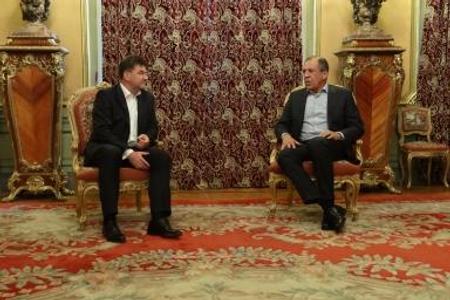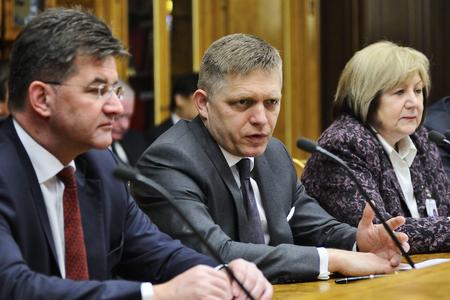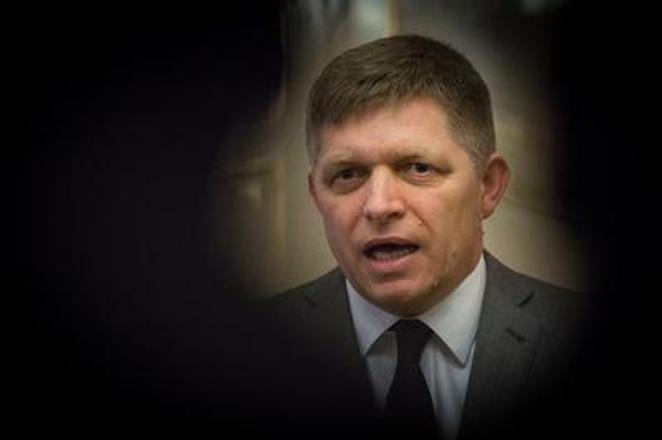The film has scandalised people in the Czech Republic, Slovakia, and beyond. Contrary to historical facts, the documentary depicts pact as defence alliance protecting socialist countries against NATO claiming that armed coup was underway in Prague at the time. There was nobody from the Czech or Slovak side to speak in the documentary, the Slovak media noted.
Putin has previously admitted that his country carried moral responsibility for the invasion, during his visit to Prague in 2006.
Most historians agree that armed forces of five Warsaw Pact countries invaded Czechoslovakia on August 21, 1968 ending the hopes of Slovaks and Czechs for the “socialism with a human face” envisioned by the communist leader at the time, Alexander Dubček. The occupation was followed by the process of so-called normalisation in the 1970s, which clamped down on personal freedoms.

Fico silent about doc
Even though Slovakia’s Foreign Ministry and the Nation’s Memory Institute (ÚPN) protested against the historical narrative presented by the documentary, the whole issue was hardly reflected in the talks that Prime Minister Robert Fico held in Moscow with Russia’s top representatives shortly after the document was aired on May 23.
Additionally, Fico’s June 1-2 visit to Russia coincided with further worsening of the already dire relations between Russia and the EU, as Russia published a list of 89 Europeans, including prominent figures, banning them from the country. The EU responded with bans for Russian diplomats on the grounds of EU institutions.
During his Moscow visit Fico went on to criticise sanctions against Russia, calling them “wrong and irrational”, as the Russian media cited him, the Sme daily reported. Analysts tend to agree that by visiting Moscow in the moment when Russia published its list, Fico harms the interests of Slovakia and provokes doubts about Slovakia’s loyalty to its partners in the EU and NATO, Sme wrote.
Fico also ignored the fact that the 1968 invasion, which was highlighted shortly before his visit to Russia on the Russian state TV’s documentary, was one of the most controversial moments in the history of the relations between Soviet Union and Czechoslovakia, and later between Russia and Slovakia. During his meeting with Sergey Naryshkin, the chairman of the State Duma, he said he saw “no complicated issues burdening the relations between Slovakia and Russia”.
“In the first place, there are many historical moments that connect us,” Fico said following the meeting as quoted by the SITA newswire.

Russian MFA unaware
Fico failed to mention the documentary also during his following meetings, with his counterpart Dmitry Medvedev as well as with Putin.
Only Slovakia’s Foreign Minister Miroslav Lajčák, who accompanied Fico in Moscow, discussed the matter with his Russian counterpart, Sergey Lavrov, as reported by the Sme daily.
Lavrov was surprised to hear about the documentary and claimed he only learned about it from the Slovak Foreign Ministry, adding that the Russian government does not control the programme of the television, Lajčák said as cited by Sme.
The Foreign Ministry issued a statement smashing the documentary already on May 31, prior to the visit of Slovakia’s state representatives to Russia, stating that it was “unpleasantly surprised by the misleading presentation” of the historical event.
“In the parts concerning the military invasion and the subsequent 20-year occupation of Czechoslovakia by Soviet armies, the documentary used misrepresentations and old ideological clichés, from which both Soviet and Russian representatives have gradually dissociated themselves and officially apologized for the invasion and the following occupation,” the ministry’s spokesman Peter Stano stated and charged that the documentary attempts to “rewrite history and falsify historical truths”, thus distorting the Slovak-Russian bilateral relations.
The ÚPN joined the ministry in its reaction as its head Ondrej Krajňák claimed that the documentary downplays and covers up some facts that had tragic consequences for many citizens of former Czechoslovakia, the SITA newswire reported.
Krajňák reiterated that the invasion of Warsaw Pact troops on the night between August 20 - 21, 1968, involved 27 military divisions from the Soviet Union, Hungary, Bulgaria, Poland and East Germany, with 500,000 soldiers, more than 6,300 tanks, 2,000 cannons and 800 aircraft, and it was “no international aid, but a military occupation and violation of the international law”, SITA reported. At least 108 people were killed and hundreds others were wounded, he noted.
“Based on historical research we are convinced that the invasion of troops in August 1968 was a power-driven intervention in the interest of keeping the influence of former USSR in one of its satellites,” Krajňák told SITA.
Czechs scandalised too
The documentary has also provoked heated reactions among the Czechs, including some top political representatives.
Czech Foreign Minister Lubomír Zaorálek requested a stance of the Russian ambassador to the Czech Republic regarding the issue. The ambassador claimed the movie did not present an official stance of the Russian government, the public service Czech Television reported.
Zaorálek went as far as to hint at what he called a dangerous connection between the documentary and the black list of 89 people from the EU published by Russia recently. Former Czech foreign minister Karl Schwarzenberg is featured on the list.
“The point of the list is supposed to be that it is those who participated in the alleged coup in Kyiv, while the movie talks about the alleged coup in 1968 not being the work of Czechs and Slovaks, but rather of SS officers and American and German imperialists,” Zaorálek said on Czech TV, adding that the film is part of a trend that is dangerous and “I am worried that something similar might repeat”, Zaoralek said.



 Prime Minister Robert Fico (source: Sme)
Prime Minister Robert Fico (source: Sme)